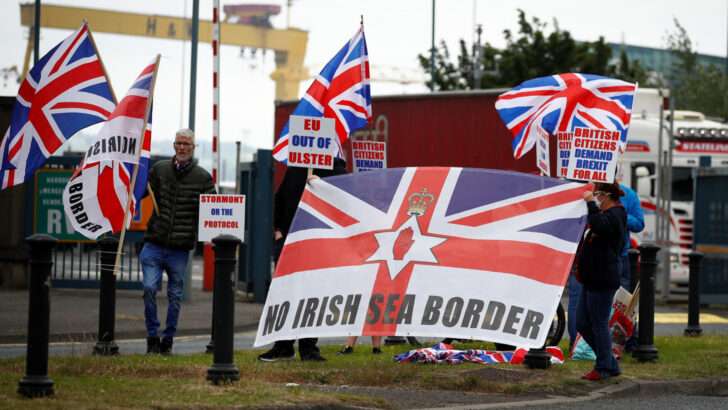A People under Siege: the Unionists of Northern Ireland, from Partition to Brexit and Beyond, by Aaron Edwards (Merrion Press, €19.99)
A touchy defensiveness, if not downright paranoia, has often seemed to be the defining character of Ulster Unionism since it first began to emerge as a distinct political phenomenon in the 19th Century.
Aaron Edwards, an academic specialising in defence and international affairs, is a Belfast native, and comes from a working-class and Orange urban tradition. His timely book is an attempt to explain Northern Ireland Unionism to those outside its ambit; but in itself is also perhaps a manifestation of that defensiveness and paranoia. ‘They’re out to get us’ could be its subtitle.
Articulate
Edwards describes the book as “an attempt to articulate what is meant by unionism” to those who, through ignorance or hostility, don’t really want to know.
This articulation largely takes the form of a detailed chronological account of Northern Ireland, from its origins as an Ulster riposte to Irish Home Rule, through its foundation under the 1920 Government of Ireland Act, to its perennial ‘minority’ problem which led to 30 years of murder, mayhem and machinations until the 1998 Belfast Agreement restored some semblance of stability.
And herein lies a weakness – sometimes there is too much detail at the expense of analysis. While some actors may be familiar – James Craig, Ian Paisley, Brian Faulkner – the cast of more minor characters may not be.
Yet as a primer which focuses attention on the tribulations of Protestants/Unionists and which tries to put their management of Northern Ireland over a century into context and perspective, A People Under Siege carries value.
Edwards states that: “At the core of the Northern Ireland conflict are two conflicting worldviews. There are Unionists who are committed to the maintenance of the Union between Great Britain and Northern Ireland and who cherish their British identity above any Irishness. Then there are Nationalists who wish to see Northern Ireland joined with the rest of Ireland, a 32-county Irish Republic, free from Britishness.”
That is a simple political binary, but there are other, more complex paths. And he approvingly discusses Graham Walker’s and Edna Longley’s explorations of those paths – both see ‘Unionism’ as a much broader phenomenon, both geographically and culturally. But that applies to ‘nationalism’ also.
The republic that enthusiastically reads Irish versions of British tabloids and supports English Premier League clubs is not an Ireland ‘free from Britishness’. Nor does it want to be. The substantial minority that sees itself as ‘Northern Irish’ does not necessarily ‘cherish their British identity above any Irishness’. It is all more complicated than that.
Omission
There is one other important omission from this book, and it is a serious one. Edwards notes that: “Brexit has given rise to an intense echo chamber of calls for a ‘united Ireland’ or a ‘new Ireland’. The champions of this fundamentally utopian future typically give little thought to winning over Unionists who have no time for it. They can’t accept that Unionists believe in the status quo and won’t be moved. Not now. Not ever.”
But there was one group of unionists and Protestants in Ireland who believed in the status quo – those who found themselves reluctantly marooned in a Free State and Republic that they had no time for. Doubtless many felt that they could never accept the change of regime – “not now, not ever”. But they did, eventually. No one pretends that it was an easy journey. But it happened.
This book would have been immeasurably improved if southern Protestantism’s experience had been interrogated, too, and to see what lessons unionism might learn from it.


 Unionist protesters in Ulster.
Unionist protesters in Ulster. 